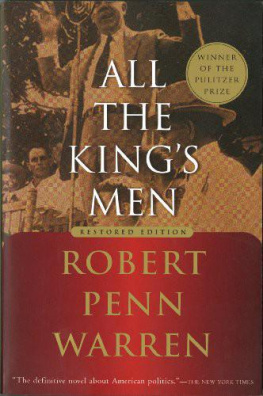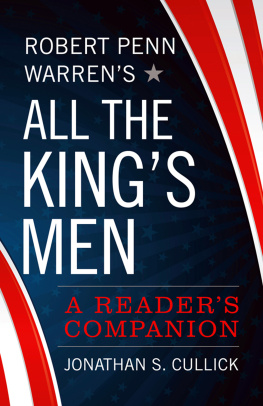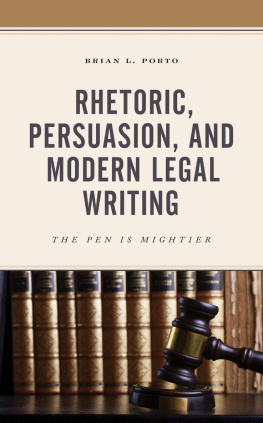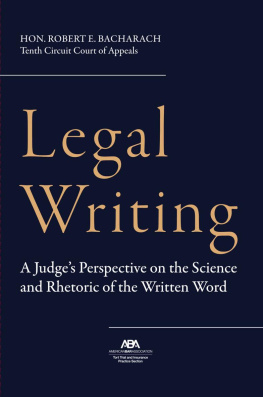Robert Penn Warren - Fundamentals of Good Writing - A Handbook of Modern Rhetoric
Here you can read online Robert Penn Warren - Fundamentals of Good Writing - A Handbook of Modern Rhetoric full text of the book (entire story) in english for free. Download pdf and epub, get meaning, cover and reviews about this ebook. year: 2012, publisher: Read Books, genre: Romance novel. Description of the work, (preface) as well as reviews are available. Best literature library LitArk.com created for fans of good reading and offers a wide selection of genres:
Romance novel
Science fiction
Adventure
Detective
Science
History
Home and family
Prose
Art
Politics
Computer
Non-fiction
Religion
Business
Children
Humor
Choose a favorite category and find really read worthwhile books. Enjoy immersion in the world of imagination, feel the emotions of the characters or learn something new for yourself, make an fascinating discovery.

- Book:Fundamentals of Good Writing - A Handbook of Modern Rhetoric
- Author:
- Publisher:Read Books
- Genre:
- Year:2012
- Rating:4 / 5
- Favourites:Add to favourites
- Your mark:
- 80
- 1
- 2
- 3
- 4
- 5
Fundamentals of Good Writing - A Handbook of Modern Rhetoric: summary, description and annotation
We offer to read an annotation, description, summary or preface (depends on what the author of the book "Fundamentals of Good Writing - A Handbook of Modern Rhetoric" wrote himself). If you haven't found the necessary information about the book — write in the comments, we will try to find it.
Fundamentals of Good Writing - A Handbook of Modern Rhetoric — read online for free the complete book (whole text) full work
Below is the text of the book, divided by pages. System saving the place of the last page read, allows you to conveniently read the book "Fundamentals of Good Writing - A Handbook of Modern Rhetoric" online for free, without having to search again every time where you left off. Put a bookmark, and you can go to the page where you finished reading at any time.
Font size:
Interval:
Bookmark:
Fundamentals |
A HANDBOOK OF MODERN RHETORIC |
Cleanth Brooks |
TO DAVID M. CLAY
CONTENTS |
Fundamentals of Good Writing
INTRODUCTION
THERE is no easy way to learn to write. There is no certain formula, no short cut, no bag of tricks. It is not a matter of memorizing rules or of acquiring a few skills. To write well is not easy for the simple reason that to write well you must think straight. And thinking straight is never easy.
Straight thinking is the basis of all good writing. It does not matter whether you are planning to write fiction, poetry, news reports, magazine articles, essays, or sermons. What is common to all kinds of good writing is more important than what distinguishes one kind from another. This is a fundamental point, and this book is an attempt to deal with the fundamentals of writing.
What is it that we must think straight about if we are to write well? Unfortunately there is no simple answer to this. A writer, as Robert Louis Stevenson says in his Essay on Style, is like a juggler who must keep several balls in the air at once.
What are the several balls? What are the considerations that a writer must simultaneously think straight about? This book is an attempt to answer that question; but even when this book is finished the answer will not be a complete one. For the present, however, we may try to reduce the considerations to three general types. We may define them in reference to various aspects of the act of writing:
1. The medium
2. The subject
3. The occasion
These terms, as we are using them, require some explanation.
A writer writes in a language, the substance, as it were, through which he exerts his force, the medium through which he communicates his ideas and feelings. This language operates in terms of certain principles and usages which a writer must observe if he is to exercise his full force or even, in some instances, to be understood at all. For example, grammar is an aspect of the medium itself. Rhythm is another aspect, and it may exercise a very powerful effect on the reader, even if he is not aware of it. Another aspect is dictionthe qualities of the individual words even beyond their bare dictionary definitions.
These topics, and others related to them, will be discussed in the course of this book, but for the present it is important only that we understand them as representing aspects of the medium, of language itself.
A writer writes about something. The something may be his own feelings, his love or his hate, or again it may be the theory of aerodynamics. But in either instance he has a subjectand one that can be distinguished from all other possible subjects.
The nature of the subject will, in some respects, dictate the nature of the treatment. For instance, if a writer is interested in explaining a process of some kind, the running of an experiment in physics or the building of a log cabin, he will have to organize his material with some reference to the chronological order of the process. If he is trying to explain why he loves or hates someone, he will probably be concerned with the analysis of traits of character which have no necessary reference to chronology; therefore, his ordering of the material may well be in terms of degrees of importance and not in terms of time sequence.
Furthermore, the subject may dictate differences in diction. For instance, if the writer is trying to explain the process of an experiment in physics, his diction will be dry and technical, clear and factual; but if he is trying to define the grief experienced at the death of a friend, his diction may well be chosen to convey emotional effects.
Or the type of rhythm may vary according to the subject. The explanation of the experiment in physics will probably involve a rather flat rhythm, or at least an unobtrusive rhythm, but the attempt to define the grief at the death of the friend will probably depend to a considerable degree for its success on the rhythm employed, for the rhythm of language, even in prose, is of enormous importance in the communication of feelings.
Third, a writer writes out of a special situation, the occasion. We may say that this situation involves three basic elements: the motivation of the writer; the nature of the reader; and the relationship between writer and reader.
As for motivation, two general types may be distinguished: expression and communication. The writer may be primarily concerned to affirm his own feelings, to clarify his own mind, to define for himself his own sense of the world. When he writes from some such motivation, the urge to expression may be said to be dominant, and he has, on such an occasion, more in common with a man singing in the bath, with the child uttering the spontaneous cry of pain, or with the cat purring on the rug than he has with the judge handing down a decision from the bench, a teacher explaining a point of grammar from the platform, or a woman giving her daughter a recipe for pie. For the judge, the teacher, and the cook are not primarily concerned to express but to communicate something.
It may be said, however, that, in the ultimate sense, we never have a case of pure expression or pure communication. Even the cry of pain, which seems to be pure expression, may be said to presuppose a hearer; the hurt child redoubles its screams when it sees the mother approaching. And the poet who has written his poem without a conscious thought of the reader, who has been concerned with the effort of getting his own feelings and ideas into form, hurries to the post office to mail his finished poem to a magazine through which it can reach a number of readers.
Conversely, even the most objective presentation of an idea or analysis of a situation may involve an expressive element. To take an extreme instance, we may say that a man may take pleasure in the accuracy and tidiness of his working out of a mathematical demonstration and feel that those qualities express him.
If it is true that we can never find an example of pure expression or of pure communication, if we have to regard expression and communication as, shall we say, the poles of the process of writing or speaking, we can still see that a great deal of variation in the relative proportions of communication and expression may exist.
When the writer is primarily concerned with expression, he does not pay attention to his audience; if, under such circumstances, he thinks of the audience, it is only to assume that there will be people enough like himself to have an interest in his work. Yet even then, even when the writer is primarily concerned with expression, his private and individual intentions will have to be represented in a medium that has public and general standards. When the writer accepts language as his medium of expression, he also accepts the standards of communication.
When the writer is primarily concerned with communication rather than expression, he must, however, give special attention to the audience which he wishes to reach. He must consider the readers interests and attitudes. Even if the writer wishes to give the reader a new interest, he must work in terms of the interests that already exist. When the writer does not, in some way, appeal to the already existing interests, the reader will not even bother to finish the book or article. Or if the writer wishes to make the reader change his attitude on some issue, he must work in terms of already existing attitudes. Unless the writer can discover that he and the reader have
Next pageFont size:
Interval:
Bookmark:
Similar books «Fundamentals of Good Writing - A Handbook of Modern Rhetoric»
Look at similar books to Fundamentals of Good Writing - A Handbook of Modern Rhetoric. We have selected literature similar in name and meaning in the hope of providing readers with more options to find new, interesting, not yet read works.
Discussion, reviews of the book Fundamentals of Good Writing - A Handbook of Modern Rhetoric and just readers' own opinions. Leave your comments, write what you think about the work, its meaning or the main characters. Specify what exactly you liked and what you didn't like, and why you think so.








